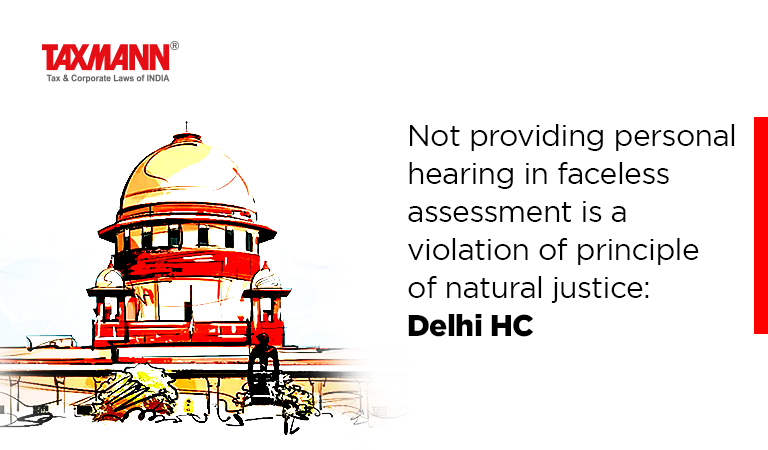Not providing personal hearing in faceless assessment is a violation of principle of natural justice: Delhi HC
- Blog|News|Income Tax|
- 2 Min Read
- By Taxmann
- |
- Last Updated on 10 November, 2021

Case Details: Umkal Healthcare (P.) Ltd. v. National Faceless Assessment Centre - [2021] 131 taxmann.com 325 (Delhi)
Judiciary and Counsel Details
-
- Manmohan and Navin Chawla, JJ.
- Satyen Sethi, Adv. for the Petitioner.
- Sunil Agarwal, Sr. Standing Counsel and Tushar Gupta, Jr. Standing Counsel for the Respondent.
Facts of the Case
The instant writ petition was filed by the assessee challenging the Assessment Order passed by the AO under section 143(3) read with section 144B. He stated that the impugned order was passed without affording a personal hearing, even when specifically requested. Hence, the order is violative of the principles of natural justice and section 144B.
AO submitted that the expression used in section 144B(7)(vii) is ‘may’ and not ‘shall’, and therefore, there is no vested right in the assessee to claim a personal hearing.
High Court Held
The Delhi High Court has quoted the ruling given in the case of Sanjay Aggarwal – [2021] 127 taxmann.com 637 (Delhi). The Delhi HC held that a careful perusal of section 144B(7) would show that liberty has been given to the assessee, if his/her income is varied, to seek a personal hearing in the matter. Therefore, to our minds, the usage of the word ‘may’ cannot absolve the respondent/revenue from the obligation cast upon it to consider the request made for grant of personal hearing.
Applying the same ratio, the Court has held that since in the present case, no hearing had been granted before passing the assessment order, there is a violation of principles of natural justice as well as the mandatory procedure prescribed in the “Faceless Assessment Scheme” and stipulated in section 144B.
List of Cases Referred to
-
- Sanjay Aggarwal v. National Faceless Assessment Centre [2021] 127 taxmann.com 637/281 Taxman 282/436 ITR 180 (Delhi)
Disclaimer: The content/information published on the website is only for general information of the user and shall not be construed as legal advice. While the Taxmann has exercised reasonable efforts to ensure the veracity of information/content published, Taxmann shall be under no liability in any manner whatsoever for incorrect information, if any.

Taxmann Publications has a dedicated in-house Research & Editorial Team. This team consists of a team of Chartered Accountants, Company Secretaries, and Lawyers. This team works under the guidance and supervision of editor-in-chief Mr Rakesh Bhargava.
The Research and Editorial Team is responsible for developing reliable and accurate content for the readers. The team follows the six-sigma approach to achieve the benchmark of zero error in its publications and research platforms. The team ensures that the following publication guidelines are thoroughly followed while developing the content:
- The statutory material is obtained only from the authorized and reliable sources
- All the latest developments in the judicial and legislative fields are covered
- Prepare the analytical write-ups on current, controversial, and important issues to help the readers to understand the concept and its implications
- Every content published by Taxmann is complete, accurate and lucid
- All evidence-based statements are supported with proper reference to Section, Circular No., Notification No. or citations
- The golden rules of grammar, style and consistency are thoroughly followed
- Font and size that’s easy to read and remain consistent across all imprint and digital publications are applied



 CA | CS | CMA
CA | CS | CMA
